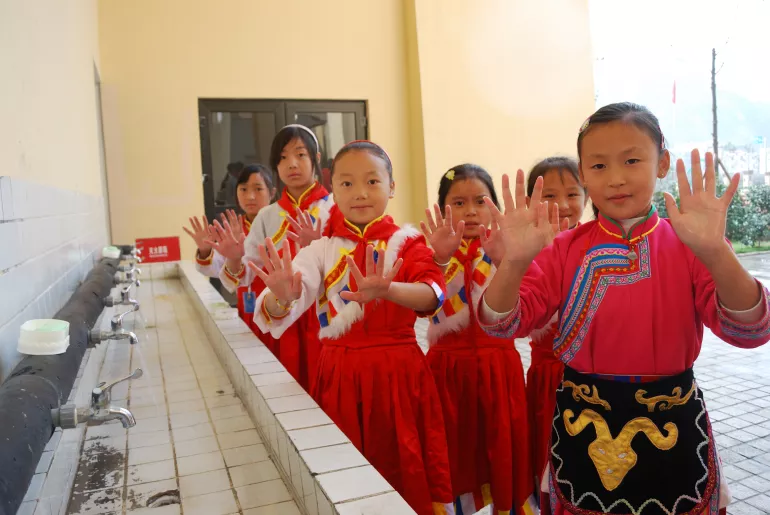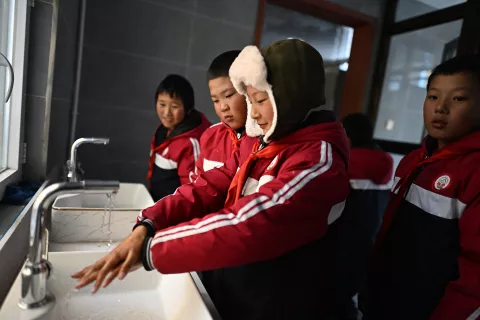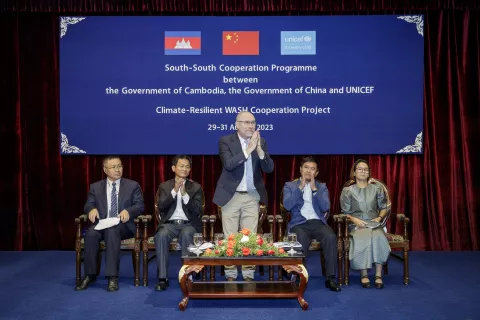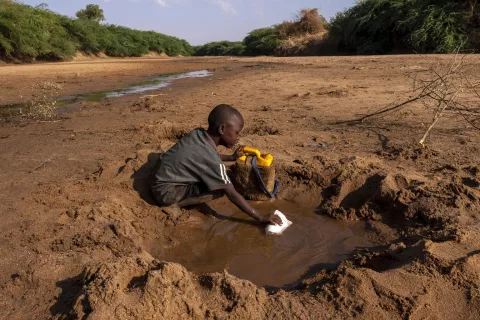China Celebrates Global Handwashing Day
Thousands participate in "clean hands save lives" campaign

- Available in:
- 中文
- English
15 October 2009, Sichuan Province – Each year, diarrhoeal diseases and acute respiratory infections cause the deaths of tens of thousands of children below the age of five in rural China.
The second Global Handwashing Day, celebrated today across China by thousands of children learning the correct way to wash hands with soap, helps to emphasize that handwashing is one of the most effective and affordable health interventions available. This year's handwashing day aims to engage children as agents of community change.
"We often forget that the simplest measures can have the greatest results in safeguarding the health of our families," said Dale Rutstein, Chief of Communication and Private Sector Partnerships for UNICEF China. "Parents, teachers and children themselves need to make sure this simple, life-saving action becomes a life-long habit."
According to a WHO estimate, about 40,000 children under five die from diarrhoea in China each year. Washing hands with soap and water, especially after using the toilet and before eating, helps reduce the incidence of diarrhoeal disease by more than 40 per cent and respiratory infections by nearly 25 per cent. Correct handwashing is also being recommended as a critical action to prevent the spread of influenza H1N1.
Worldwide, about 88 percent of diarrhoeal deaths are attributable to unsafe water, inadequate sanitation and poor hygiene. According to China's Ministry of Health access to improved drinking water in rural China is almost 95 per cent, but rural access to sanitary latrines is only 60 per cent.
Supported by UNICEF, a major handwashing campaign has been launched in ten counties in Sichuan Province that were severely affected by last year's Wenchuan earthquake. UNICEF also developed a 60-second public advertisement on handwashing and an 8-minute theme video which will be aired on 120 city/county TV stations in 28 provinces across China, estimated to reach millions of viewers.
"With students moving into permanent school buildings, the efforts in disease control shall not be relaxed during the process," Mr Yang Zhenbo, UNICEF China Water and Sanitation Specialist noted. "Some of the displaced children and families are still living in prefabricated camps. We will continue to disseminate the messages on handwashing, sanitation and disease prevention."
The activities, sponsored by UNICEF, were organized by the National Patriotic Health Campaign Committee Office, Sichuan Provincial Patriotic Health Campaign Committee Office and local governments.
A total of 5,000 hygiene kits provided by UNICEF were distributed to students at the events. Each kit contains towels, soap, combs, shampoo, toothbrushes, toothpaste and other supplies.
The 15 October Global Handwashing Day is an initiative of the Global Public-Private Partnership for Handwashing with Soap. This year millions of children, teachers, parents, celebrities and government officials in over 80 countries joined the celebrations.
Media contacts
About UNICEF
UNICEF works in some of the world's toughest places, to reach the world's most disadvantaged children. Across 190 countries and territories, we work for every child, everywhere, to build a better world for everyone. For more information about UNICEF and its work for children visit www.unicef.org.
| Visit UNICEF China website: www.unicef.cn Follow us on Sina Weibo: http://weibo.com/unicefchina Tencent Weibo: http://t.qq.com/unicef Wechat: unicefchina |




